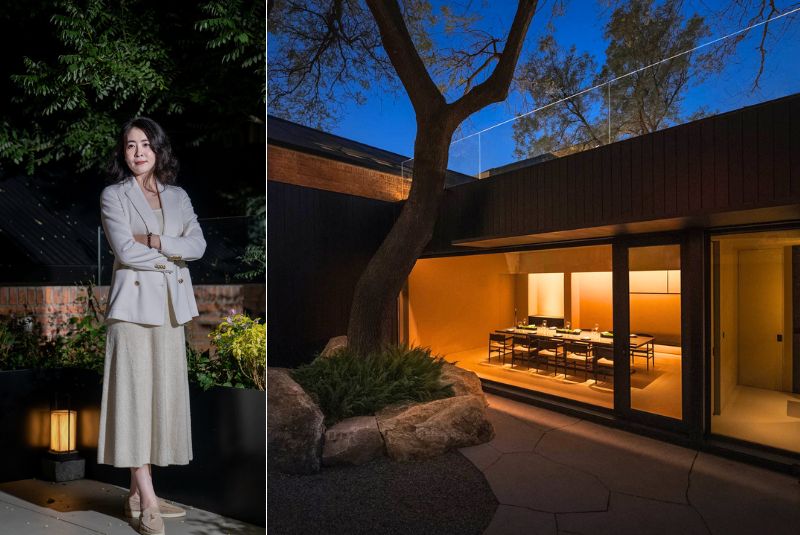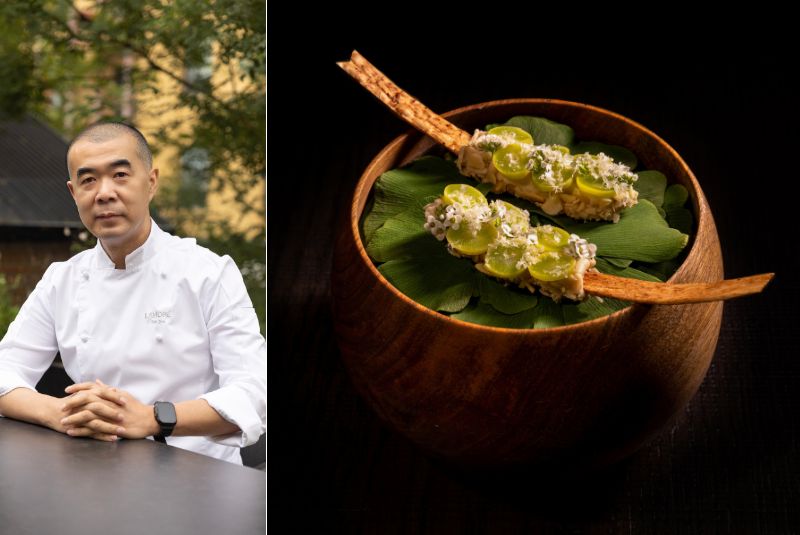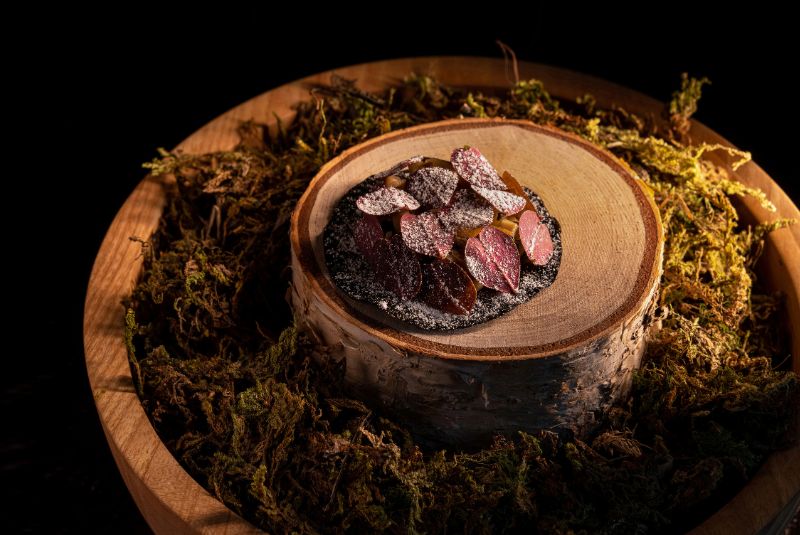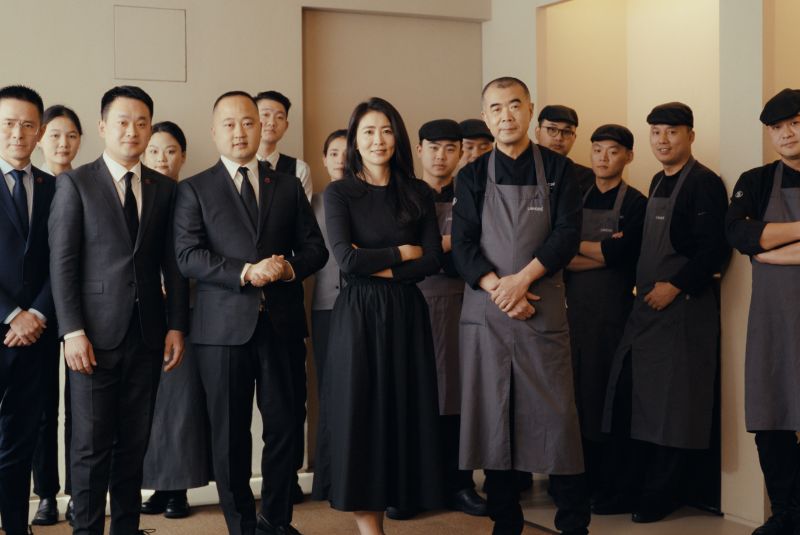Driven by singular focus and dedication, Lamdre in Beijing is transforming plant-based cuisine in China. Now, only a year after opening, it receives the American Express One To Watch Award 2024 as part of Asia’s 50 Best Restaurants. Owner Zhao Jia and chef Dai Jun explain their shared, nature-focused vision
For Zhao Jia, Lamdre was destiny. “I’d always wanted to make a restaurant like this,” says the first-time restaurateur. “Then, fate led me to this courtyard.”
Nestled in the heart of Sanlitun, the serene plant-forward restaurant’s elegant courtyard house feels a world away from one of Beijing’s busiest neighbourhoods. Its blend of Chinese heritage with modern, minimalist aesthetics make it hard to imagine a more perfect setting for Zhao’s dream of sharing what Chinese vegetarian cuisine can be with the world.
Meeting experienced chef Dai Jun, introduced by a mutual friend, was also destiny in Zhao’s eyes. “The way he thinks about plant-based cooking and vegetarianism was perfectly aligned with me,” she says. “Cooking that is simple, natural and brings out the ingredients’ true flavours.”
Lamdre is the first culinary venture of restaurateur Zhao Jia
Entering Lamdre does truly feel like fate has worked its magic. Zhao’s exacting vision and Dai’s sharply honed culinary artistry combine to push forward contemporary vegetarian cuisine in China. Opened at the end of 2022, Lamdre burst onto the Beijing dining scene, with rave reviews and hard-to-score tables quickly becoming the norm. Now only one short year later, the American Express One To Watch Award 2024 is catapulting it onto the global stage.
Upstairs, the main dining room exudes a tranquil calm: muted colours bathed in sunlight streaming in through skylights. Ceramics handpicked during Zhao’s travels through Japan and a single striking painting from artist Wang Yan Cheng accent the space. On the ground floor, a collection of private rooms feature large picture windows looking onto the restaurant’s manicured courtyard and soaring locust tree.
With a career first in the arts and culture, it had long been Zhao’s dream to open a restaurant. “I think food is a language. It awakens memories,” she says. “It isn’t just something to fill you up.” A vegetarian herself, Lamdre is about more than just not eating meat (though the restaurant is not vegan, as it uses milk and eggs on occasion). “It’s about a way of life,” she says – one that prioritises health, sustainability and a connection to the natural world.
The accidental vegetarian chef
While Lamdre marks Zhao’s debut culinary venture, Dai Jun has more than three decades of professional cooking under his belt. Coming up through kitchens in five-star hotels, the Beijing-born chef was classically trained in Cantonese and Chaozhou cuisine. In 2011, he fell into vegetarian cuisine quite by chance – learning only at a job interview that the restaurant was plant based. The place was King’s Joy, Beijing’s first and much-lauded temple to contemporary vegetarian fine dining. It was an accident, but one that felt right. “Personally I prefer cooking vegetarian cuisine,” he says. “It’s actually more challenging.”
Chef Dai Sun sees vegetarian cuisine as the ultimate expression of ingredients
Without much guidance, Dai learned through trial and error. “My evolution as a vegetarian chef has come in three steps,” he reflects. “When I first switched from Cantonese cuisine to plant-based dishes, I didn’t know how to use vegetarian food to express what I wanted. I only knew how to follow my old way of making meat dishes. We would just remove the meat and use tofu instead!”
Later at Vege Wonder, another of the Chinese capital’s celebrated dining spots for vegetarian haute cuisine, he progressed beyond this mindset, elevating the vegetables themselves. “The second step in my journey was making the dishes more refined,” Dai explains. “The technique behind it was actually very complicated."
“Lamdre is my third step. I feel that I’m different than in the past,” he continues. “Here, I use very simple ingredients – a potato or some eggplant – ordinary things transformed through creativity for dishes that are simple and to the point.”
Integrity above all
This approach of simplicity at Lamdre champions the ingredients, which may be ‘ordinary’ in Dai’s words but in reality are anything but. They are meticulously sourced from around China – pine nuts from Taizhou in Zhejiang, gingko from Tengchong in Yunnan, buckwheat from Inner Mongolia – and are the stars of each dish.
Ingredients from all around China are included in the seasonal tasting menu
Time not spent in the kitchen is spent on research trips across the country, discovering ingredients and traditions unique to each Chinese province. “We go to smaller places, like the countryside in Chaoshan or the morning market in Yunnan,” says Zhao. “There are always so many ingredients I’ve never seen before.” These finds end up on the menu, like an enchanting landscape of Yunnan mushrooms brought out by trolley and prepared tableside in a Guizhou-style sour soup.
Zhao speaks with passion and reverence. “Most important is that the dish must be delicious and that the integrity of the ingredients isn’t destroyed,” she says about the philosophy at Lamdre. “We have to respect the ingredients’ original flavours and beauty.”
This belief drives the seasonal tasting menus where polished yet unfussy dishes arrive one after another. On the autumn/winter menu, a surprising crystal-clear pumpkin soup is supercharged with the squash’s sweet, natural flavour while paper-thin slices of bamboo shoots draped over asparagus lettuce and water bamboo are punctuated by a gentle green chili sauce.
Having opened in 2023, Lamdre has quickly become a must-visit restaurant in Beijing
The restaurant’s signature tofu, available on its classic set menu of guest favourites, is an elevated homage to China’s humble childhood comfort food. Handmade with soybeans from Heilongjiang, the tofu is soaked in matsutake mushrooms and seaweed from Fujian for two hours, then served with soy sauce, chilli sauce and a cup of fresh soy milk all made in-house.
Equal focus is placed on the wine list and pairing, which features organic, natural and biodynamic bottles alongside the restaurant’s own Chinese yellow wine (huangjiu) from Zhejiang. A tea pairing option is soon to be added.
Inspiration for the future
Destiny might have brought Zhao and Dai together for Lamdre, but it’s been plenty of hard work and dedication that’s led to their success over the past year. “I think we’ve been able to turn it into what it is so quickly because Chef Dai and our team have truly run Lamdre from a place of love, rather than just treating it as a restaurant,” says Zhao.
Zhao put Lamdre’s success down to the restaurant’s dedicated team
The word ‘lamdre’ comes from a Tibetan Buddhist meditative system – literally ‘path’ and ‘fruit’, or that the result is within the journey. “The name captures our attitude at Lamdre,” she explains. “If we focus on working hard, good results will naturally come.”
And the fruits of their labour are increasingly evident. For both Zhao and Dai, winning the American Express One To Watch Award is inspiration to keep on the path they are forging. “I’m so touched,” says Zhao of being the first restaurant in Mainland China to win. “I’m grateful that this can help share our philosophy and what we are doing at Lamdre with more people around the world. It makes us even more determined to keep exploring and improving.”
“It’s an honour as a chef. We’ve only been open for a year, so receiving this level of recognition is such a wonderful surprise,” says Dai. “This is an inspiration to keep reaching higher as we move forward.”
Step into Lamdre through this video:
The 12th edition of Asia’s 50 Best Restaurants, sponsored by S.Pellegrino & Acqua Panna, will be announced on 26th March 2024 from Seoul. To stay up to date with the latest news and announcements ahead of the ceremony, browse the website, join the community on Instagram, find us on Facebook, visit us on X, subscribe to our YouTube channel and sign up for the 50 Best newsletter.

